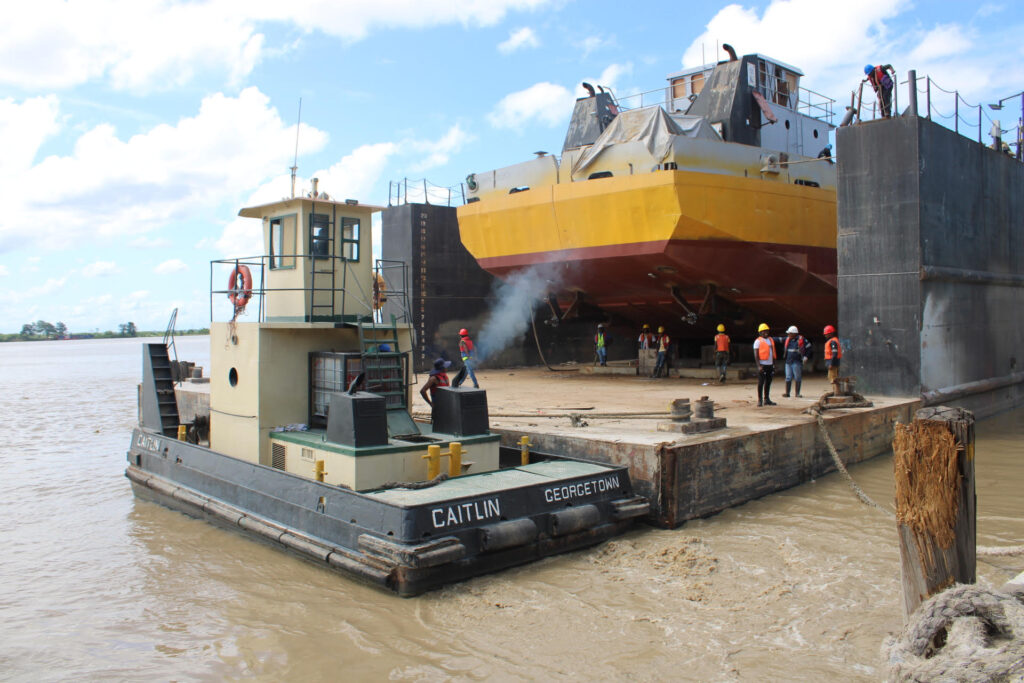Guyana Port Inc. (GPI) is taking bold steps towards transforming Guyana’s maritime sector, and at the helm of this transformation is its CEO, Pritipaul Singh Jr. A dynamic and visionary leader, Pritipaul has spearheaded the company’s evolution, not only within the context of the expanding oil and gas industry but also through diversification into ship repair, dry docking, shipbuilding, and dredging. Under his leadership, GPI has expanded rapidly, positioning itself as a key player in Guyana’s economy. However, this transformation has not been easy; it has been driven by a mix of strategic investment, a focus on empowerment, and a deep commitment to sustainability.
When Pritipaul Singh Jr. took charge of Guyana Port Inc., it was a much smaller operation. Initially, his primary focus was to cater to the demands of the oil and gas industry, which was experiencing rapid growth. However, as Pritipaul continued to lead GPI, he realised the importance of expanding the company’s portfolio to ensure long-term success and contribute more broadly to Guyana’s economic development. “When I first came into the business, we were very focused on servicing the oil and gas sector. But over time, it became clear that we needed to diversify to future-proof the company. We needed to invest in other sectors that could benefit from the growing demand for maritime services,” Pritipaul shared in an interview.

A turning point came in 2022, when Pritipaul Singh Jr. was able to buy out part of his father’s company, which included a dry docking facility. This acquisition was pivotal in setting the course for GPI’s expansion into ship repair and shipbuilding. At that moment, Pritipaul realised the potential of transforming the company into a much larger and more versatile operation. In fact, since taking this step, GPI has grown threefold in size. “We’ve come a long way since those early days. The key has been our ability to adapt, to see opportunities, and to invest where the market demands it,” Pritipaul reflects.
As part of this growth, GPI has made a series of strategic investments that have helped enhance its capacity in ship repair, dredging, and shipbuilding. One of the most significant investments was a $40 million expansion announced in 2025. The investment aimed at strengthening GPI’s capabilities in dredging and shipbuilding reflects the company’s understanding of Guyana’s evolving maritime needs. According to Pritipaul, the decision to focus on dredging was informed by the government’s tax incentives for shipbuilding and the country’s need to address the increasingly silt-laden waterways. “The river system in Guyana is constantly shifting. Dredging is a long-term need, and with the government’s support, we saw a clear opportunity to invest in the future of our ports,” Pritipaul stated.
Guyana’s river system, rich in mud and silt, requires constant dredging to ensure the smooth passage of vessels. As the country’s oil and gas sector continues to boom, this need has only grown more urgent. “We’ve been making a deliberate effort to improve the dredging services we offer. As our ports expand, maintaining the navigability of these rivers is critical to ensuring smooth operations. It’s not just about dredging for the sake of it—it’s about ensuring that the economy continues to grow with the flow of goods and services,” he explained.
This commitment to dredging, shipbuilding, and port services forms a large part of GPI’s broader strategy to become a leader in Guyana’s maritime industry. However, the company is also carefully considering the evolving nature of the local economy. “We are not just responding to the needs of today. We are investing for tomorrow. Our shipbuilding efforts aren’t aimed at competing with global giants in places like East Asia. Instead, we are focusing on filling a local gap—building vessels that serve specific needs right here in Guyana,” Pritipaul shared.
While GPI doesn’t plan to compete with the global scale of shipbuilders in Asia, the company sees an opportunity to fulfil the growing demand for specialised vessels in Guyana. With the oil and gas sector fuelling much of this demand, it has become essential for GPI to build ships locally to help support the increased demand for offshore and industrial vessels. Shipbuilding, as a natural extension of GPI’s ship repair expertise, positions the company well to expand this area with minimal additional training. “The skill sets we use in ship repair are very similar to what we need in shipbuilding. It’s a natural progression for us,” he said.

Another aspect of GPI’s growth involves its commitment to developing the skills of its workforce. Pritipaul emphasises that the company’s workforce is a crucial element of its strategy. In order to meet the demands of the oil and gas industry and to expand into dredging and shipbuilding, GPI has invested in training programmes designed to upskill its employees. “We cannot grow if we don’t empower the people who make the business work. Our workforce is our greatest asset, and investing in their training is key to long-term success,” Pritipaul explained.
While GPI’s focus on expanding shipbuilding and dredging is evident, the company has also worked to address other challenges faced by Guyana’s growing maritime sector. As the oil and gas industry continues to increase, so too does the demand for ship repair services. To meet this need, GPI has entered into a joint venture with the Ghanaian company Primaridian Offshore to develop a dry docking facility in Demerara. This collaboration is designed to provide oil and gas operators with a local option for ship maintenance, reducing the need for vessels to travel as far as Houston, Texas or Louisiana for repairs. “The idea was simple: why should our oil and gas vessels travel thousands of miles to get serviced? By bringing this facility closer to home, we can save time and cost for operators,” Pritipaul stated.
This partnership not only brings Primaridian Offshore’s capital-raising expertise and ship repair capabilities to the table, but it also leverages GPI’s local knowledge of the labour market and port operations. “Primaridian Offshore’s experience in ship repair facilities will complement our own expertise. Together, we aim to create a more efficient, cost-effective option for local and international shipping companies,” Pritipaul said.
For Pritipaul, the collaboration represents a significant step in strengthening the maritime sector in the region. “The partnership is about creating something that benefits the entire sector. It’s not just about GPI or Primaridian—it’s about positioning Guyana as a key player in maritime services in the Caribbean. Together, we can make a big impact,” he remarked.
The impact of this joint venture is expected to extend beyond just servicing oil and gas vessels. With a more efficient dry docking facility in place, GPI will be able to cater to the growing demand for ship repair services in the region, benefiting other sectors as well, such as logistics, transportation, and even tourism.
Aside from the direct impact on the maritime industry, GPI’s efforts in shipbuilding, dredging, and port services will also have a significant ripple effect on the broader economy. “By investing in the maritime industry, we are helping to create jobs and stimulate growth across a number of industries. It’s not just about the direct jobs in shipbuilding and dredging. We are creating opportunities for people in other sectors, from logistics to manufacturing to transportation,” Pritipaul said.
This focus on economic diversification is central to GPI’s strategy. While the oil and gas sector continues to be a major driver of economic growth in Guyana, Pritipaul is determined to ensure that the country’s economy doesn’t become overly reliant on this single industry. “We want to make sure that the growth of the oil and gas industry leads to a broader, more diversified economy. That’s why we’re focused on shipbuilding, dredging, and other maritime services,” Pritipaul remarked.
As GPI continues to expand its capabilities, the company is also ensuring that its operations meet international standards. GPI is already ISO 9001 certified, a testament to its commitment to quality and excellence in all aspects of its operations. “Quality is at the heart of everything we do. We are constantly looking for ways to improve our services and to stay ahead of the curve. This is why we are also exploring the use of robotics and other advanced technologies in areas like abrasive blasting and ship maintenance,” he explained.
Looking ahead, Guyana Port Inc. is poised to play an even more significant role in the maritime sector. With its ongoing investments in shipbuilding, dredging, and port maintenance, combined with its partnerships with international players, GPI is well-positioned to serve as a cornerstone of Guyana’s maritime infrastructure. Pritipaul is confident that the company’s investments today will pave the way for future growth, not just in maritime services but also in the wider economy.
“The work we are doing today is about building a sustainable future for Guyana,” Pritipaul concluded. “We’re not just making investments in infrastructure; we’re making investments in the people, the economy, and the future of our nation.”
Through innovation, strategic partnerships, and a focus on empowerment, Guyana Port Inc. is not just transforming the maritime sector but is actively contributing to the diversification of Guyana’s economy, ensuring that the country is well-equipped for the challenges and opportunities of tomorrow.



